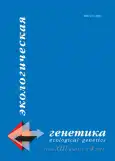Sup35 prionization [PSI+] influence the frequency of the gene and chromosome mutations, accounted in the alpha-test in yeast Saccharomyces cerevisiae
- Authors: Andreychuk Y.V.1, Zhuk A.S.1, Inge-Vechtomov S.G.1, Stepchenkova E.I.2, Shiriaeva A.A.1
-
Affiliations:
- Saint Petersburg State University
- St Petersburg Branch of Russian Academy of Sciences, Vavilov Institute of General Genetics
- Issue: Vol 13, No 4 (2015)
- Pages: 22-24
- Section: Articles
- URL: https://bakhtiniada.ru/ecolgenet/article/view/2433
- DOI: https://doi.org/10.17816/ecogen13422-24
- ID: 2433
Cite item
Full Text
Abstract
Keywords
Full Text
##article.viewOnOriginalSite##About the authors
Yulia Viacheslavovna Andreychuk
Saint Petersburg State University
Email: Yullinnabk@yandex.ru
Junior research fellow, Institute of translational biomedicine
Anna Sergeevna Zhuk
Saint Petersburg State University
Email: ania.zhuk@gmail.com
Junior research fellow, Department of genetics and biotechnology
Sergey Georgievich Inge-Vechtomov
Saint Petersburg State University
Email: ingevechtomov@gmail.com
Head of the department of genetics and biotechnology
Elena Igorevna Stepchenkova
St Petersburg Branch of Russian Academy of Sciences, Vavilov Institute of General Genetics
Email: stepchenkova@gmail.com
Head of the Laboratory, Laboratory of mutagenesis and genetictoxicology
Anna Alexandrovna Shiriaeva
Saint Petersburg State University
Email: annabiologic@gmail.com
Junior research fellow, Department of genetics and biotechnology
References
- Borchsenius A. S., Tchourikova A. A., Inge-Vechtomov S. G. (2000) Recessive mutations in SUP35 and SUP45 genes coding for translation release factors affect chromosome stability in Saccharomyces cerevisiae. Curr. Genet. V. 37: P. 285-291.
- Inge-Vechtomov S. G., Repnevskaia M. V., Karpova T. S. (1986) Hybridization of cells of the same mating type in Saccharomyces yeasts. Genetika. V. 22: P. 2625-2626.
- Iourov I. Y., Vorsanova S. G., Liehr T., Yurov Y. B. (2009) Aneuploidy in the normal, Alzheimer’s desease and ataxia-telangesia brain: Differential expression and pathological meaning. Neurobiology of desease. V. 34: P. 212-220.
- Nieznasnski K., Podlubnaya Z. A., Nieznasnski H. (2006) Prion protein inhibits microtubule assembly by inducing tubulin oligomerization. Biochemical and Biophysical Res. Com. V. 349: P. 391-399.
Supplementary files






